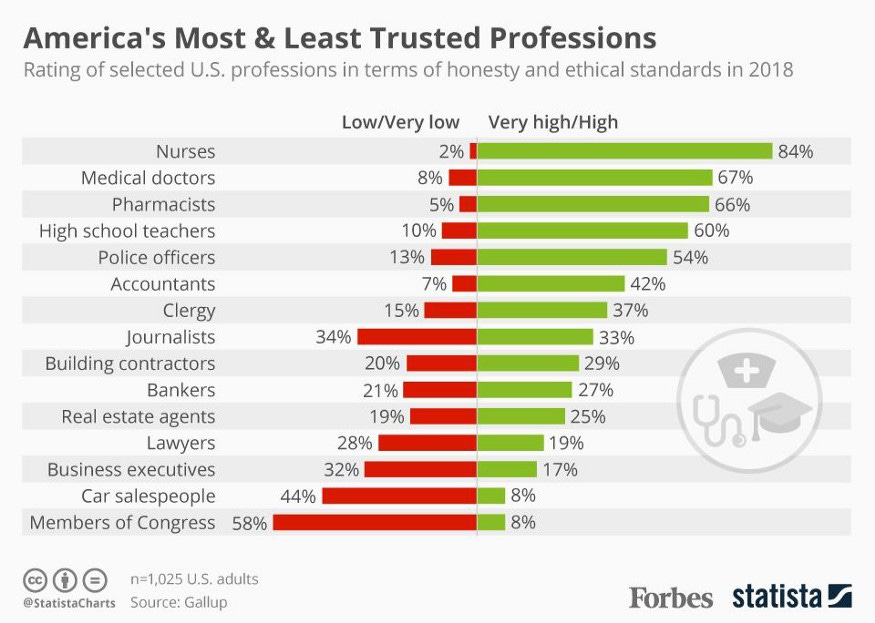Are You A Covid Nazi?
The unsurprising link between the fear of infectious disease and authoritarian political belief.
Ed. Note: this story was originally published on May 18, 2020 on medium.com
Medium eventually removed this story under its version of “Article 58:” the Soviet Union’s catch-all criminal code used to imprison millions of people in gulags for most of the 20th century.
I asked Medium moderators what exactly in my story was in violation - and of course they didn’t have a specific line or section that broke their rules. As you’ll read below, this story links to a peer-reviewed paper in a respected medical journal to validate everything I say. I’m not making any original claims. I’m just publicizing a curious observation about the link between the rise of authoritarianism and infectious disease. This observation is not disputed by anyone as far as I can tell. It’s well documented in the PLOS ONE paper, and by other researchers. It even has a name: parasite stress theory.
In May of 2020, I had no idea what was coming - and how prescient this kind of observation might have been. I wish I had been a little more bold and predicting what we were likely to see. It’s all in the research - and it would have been pretty easy to say we could expect a range of authoritarian measures even from Western democracies, like vaccine mandates and passports, closed borders, restricted travel, fines, medical discrimination, internment camps, extended lockdowns, etc. I failed to do so because I just couldn’t imagine it would get that bad.
But I certainly could not have predicted that a story about authoritarian measures as a result of infectious disease would lead to my story getting taken down by Medium. This specific irony is the reason I’m moving my best articles from Medium to substack, and why I’m not writing on Medium anymore. They embraced the very authoritarian policy that I flippantly wrote about in May, 2020.
I have not edited this story at all since initial publication. Enjoy:
Most Nazis weren’t goosestepping brown shirts, dragging Jews from their homes or driving Panzers through France. Most Nazis were just regular folks who looked the other way when the brown shirts came through. They weren’t suspicious of the strange new labor camp at the edge of town that didn’t seem to produce anything but acrid smoke.
I’m bringing Nazis up because everyone has that thought experiment, if they’re thoughtful at all, of wondering what THEY would do if they found themselves in Nazi Germany.
Would you have stood against the murderous state? When would you have? Would you have wondered about increasingly tighter controls on Jewish people? Would it have been when the German state banned Jewish gun ownership? I mean who needs a gun? Or would you have stood up when your Jewish neighbors were piled onto a cattle car? It would have been too late then, of course.
Would you have even noticed? What would be your breaking point that would turn you from a good citizen to a seditious rebel? Would you speak out? Would you merely whimper?
Or, would you have blindly and uncritically accepted the state’s dogma?
If you are honest with yourself, you might come to an alarming conclusion: it’s likely you would have been a good little Nazi. Me too. I mean… I’m a busy guy in the 21st century with all the conveniences of modern life. I probably would have been even more distracted and busy in 1930s Germany, living during a depression that had lasted most of my lifetime.
You and I? We’d be good Nazis.
We can kid ourselves and think maybe we’d have done something. But what?
You probably wouldn’t have risked your life (and the lives of your spouse or children) to hide Jews under the floorboards, or engaged in dangerous sabotage of the Nazi war machine. You wouldn’t have stormed Hitler’s house with a machete and saved the world. Right? Does that really sound like something you’d do? Probably not. Do you even own a machete? Have you ever stormed anything?
So the real question you might ask is, how could otherwise normal people be so easily and almost completely bowled over by incrementally evil state policies?
It turns out that in addition to being absorbed in maintaining our own lives, people also grow increasingly authoritarian if they believe a risk of infectious disease is on the rise. It’s the same with any belief that “we” are being attacked, as Herman Goering noted during the Nuremburg trials:
Voice or no voice, the people can always be brought to the bidding of the leaders. That is easy. All you have to do is tell them they are being attacked and denounce the pacifists for lack of patriotism and exposing the country to danger. It works the same way in any country.
I’d argue it works even if the attacker is a virus.
Research published in PLOS ONE reveals this tendency:
Study 1 revealed that parasite prevalence strongly predicted cross-national differences on measures assessing individuals’ authoritarian personalities, and this effect statistically mediated the relationship between parasite prevalence and authoritarian governance. The mediation result is inconsistent with an alternative explanation for previous findings. To address further limitations associated with cross-national comparisons, Study 2 tested the parasite stress hypothesis on a sample of traditional small-scale societies (the Standard Cross-Cultural Sample). Results revealed that parasite prevalence predicted measures of authoritarian governance, and did so even when statistically controlling for other threats to human welfare. (One additional threat — famine — also uniquely predicted authoritarianism.)
This specific research focused on parasites, rather than infectious disease broadly, but the fear is the same. The research mentions infectious disease almost synonymous with parasitic disease:
Why might there be a causal link between the prevalence of infectious diseases in the local ecology and an authoritarian system of governance?…Because many disease-causing parasites are invisible, and their actions mysterious, disease control has historically depended substantially on adherence to ritualized behavioral practices that reduced infection risk.
A virus or a waterborne parasite… both are invisible and inscrutable. And both require specific behavior modifications to minimize risk.
At this point, you might be saying to yourself, “well of course we require the state to engage in extraordinary measures to restore order and protect us from this outbreak. We might not like it, but we have to stop this dangerous virus.”
Does that feel like a comfortable narrative niche that you just slipped into?
You might ask yourself: are there any alternatives to minimizing the impact of infection risk without expanding the power of the state?
Is it possible that someone in the state might be using this pandemic as an opportunity to primarily enshrine themselves with more power?
Are you being rallied around a cause to do the bidding of your leaders?
Maybe now you see me as some kind of enemy of society for even asking these questions. I’m exposing the country to danger by even questioning the official word of the Trump administration and various governors?
I’m not saying you’re a Nazi for wearing a mask or sheltering in place. I’ve been doing the same things.
I am saying we should be much more cautious and thoughtful about the exact dictates coming from our political leadership. We shouldn’t trust them as a matter of course. We should be skeptical. They haven’t earned our trust. Most people rank Congress as less trustworthy than used car salesmen.
Why should our lack of trust in these people shift just because their policies involve a plausibly scary event? We should be MORE skeptical, especially when their policies all weaken institutions that strengthen individuals.
Don’t merely whimper as the political class erodes civil society, human freedom and you ability to earn a living. Ask questions. Ask yourself if their most draconian policies are necessary or effective.
One way to know: when the data changes, do the policies change? As far as I’ve seen, the data has changed, and the policies have remained the same. The narratives are now about an indefinite shutdown until some point when the virus is no longer a threat. That’s an unacceptable timeline, and you have to ask: cui bono?







Excellent. Im afraid I might have been a good little Nazi. I hope not.